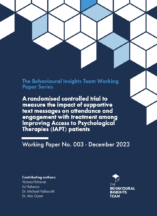Abstract
In 2019/20 1.7 million people were referred into the Improving Access to Psychological Therapies (IAPT) service in England. Of these, one in three did not complete a course of treatment (defined as attending two or more treatment appointments). One reason for dropout is long wait times with limited communication. Our randomised controlled trial (RCT) including 17,000 patients found that patients who received text message updates on the effort being exerted by those providing the IAPT service were 1.7 percentage points (p = 0.029, 95% CI: 0.06ppts to 2.7ppts) more likely to complete a course of treatment (defined as attending two or more treatment appointments), compared with usual care. This is a relative improvement of 3.5% (p = 0.029, 95% CI: 0.01% to 5.5%). The patients in the treatment group also attended more appointments on average. If scaled up, this low-cost intervention could lead to many additional patients completing treatment in IAPT, thereby substantially improving the effectiveness of the service. These results are also relevant to any service that is attempting to reduce its rate of drop-outs and missed appointments.
Keywords: Randomised controlled trial, cost effectiveness, service delivery, psychological treatment






